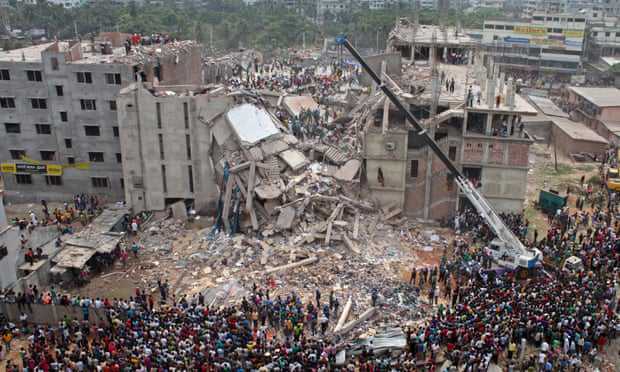MPs are right to ask how a dress can be bought for £2.50 when it’s made in the UK, where the minimum wage is £7.83

Britain spent around £40bn on clothes last year, but most of us are dimly and uncomfortably aware of the industry’s true costs. Only occasionally are we jolted into acknowledging them. Five years ago, the Rana Plaza factory complex in Bangladesh collapsed, killing 1,134 people. The death toll – and the fact that frightened workers had been ordered into a building with large cracks – shocked the world into a reluctant recognition that labourers earning a pittance for clothing western consumers are often doing so in unsafe circumstances.
The outrage led to the Bangladesh Accord, a legally binding international agreement on fire and building safety backed by major western brands. It covers both independent inspections and remediation. Worker empowerment and trade union involvement are key components. The improvements have been dramatic, and its five-year term was extended to 2021.
Now it is under threat. The Bangladesh high court has ordered its Dhaka office to close over concerns of insufficient government scrutiny. On Thursday the court said it could operate for one more week, pending a hearing of its appeal against closure. Though its Amsterdam office will carry on, the Accord’s work would be drastically slowed or limited without its Dhaka operations – while 1,450 workplaces it covers still need urgent safety upgrades. But Bangladeshi ministers have argued it’s time to regain control of inspections, insisting it is doing better than competitor nations. Observers are sceptical, saying that existing domestic inspections are inadequate; that a proper transition between inspection regimes would be needed; that trade union activity is harshly repressed; and that the industry’s influence – it makes up four-fifths of the country’s exports and produces many of its MPs – poses obvious problems. Bangladesh must be urged to back the Accord: Esprit and H&M have appealed for its work to continue, as have the European parliament and others. But western countries should look closer to home too as they consider the effects of the fashion industry.
In Britain, a parliamentary environmental audit committee inquiry into the social and environmental impact has been probing the treatment of workers in British factories: “You’ve got fabric, heating and lighting, council tax, business rates and wages … How can you buy a dress for £2.50 that’s made in Leicester when the minimum wage is £7.83?” the committee’s chair, the Labour MP Mary Creagh, asked this week.
For families on a tight budget, a school shirt costing £1.50 is a godsend. But their struggle to clothe their children reflects Britain’s political choices. It cannot be right to expect even more disadvantaged people to sacrifice their health, safety and wellbeing while the British government cuts taxes for the better off. Many of these clothes are bought by shoppers indulging themselves with outfits worn a handful of times and thrown away: on some estimates, the number of items bought per consumer has doubled in a decade. Ms Creagh says charity shops are inundated with poor-quality clothes that are hard to sell. Last spring alone 235m garments ended up in landfill – a reminder of the industry’s huge environmental and social costs.
Manufacturers complain that brands now demand higher safety and environmental standards yet push them ever harder to cut costs. Pressing garment-exporting countries on working conditions is important. But western governments should also keep a close eye on the behaviour of domestic companies. Consumers too have a part to play. Telling brands they care is important. But so is showing that they do, through the willingness to pay a fair price.
Since you're here…
… we have a small favour to ask. Three years ago we set out to make The Guardian sustainable by deepening our relationship with our readers. The same technologies that connected us with a global audience had also shifted advertising revenues away from news publishers. We decided to seek an approach that would allow us to keep our journalism open and accessible to everyone, regardless of where they live or what they can afford.
More than one million readers have now supported our independent, investigative journalism through contributions, membership or subscriptions, which has played such an important part in helping The Guardian overcome a perilous financial situation globally. We want to thank you for all of your support. But we have to maintain and build on that support for every year to come.
Sustained support from our readers enables us to continue pursuing difficult stories in challenging times of political upheaval, when factual reporting has never been more critical. The Guardian is editorially independent – our journalism is free from commercial bias and not influenced by billionaire owners, politicians or shareholders. No one edits our editor. No one steers our opinion. This is important because it enables us to give a voice to those less heard, challenge the powerful and hold them to account. Readers’ support means we can continue bringing The Guardian’s independent journalism to the world.
If everyone who reads our reporting, who likes it, helps to support it, our future would be much more secure
Source: https://www.theguardian.com
Tags :
Previous Story
- Two-day int’l conference on business begins in Dhaka
- China's Dezhou signs MoUs with Bangladesh to boost...
- Bangladesh to eject safety inspectors brought in after...
- India-Bangladesh To Start Cruise Tourism Via Picturesque Sunderbans
- Bangladesh needs to diversify its export basket
- Danish aid to continue supporting Bangladeshi textile industry
- Rock ‘n’ roll is dying in Bangladesh
- Bangladesh clothing factories face squeeze if safety push...